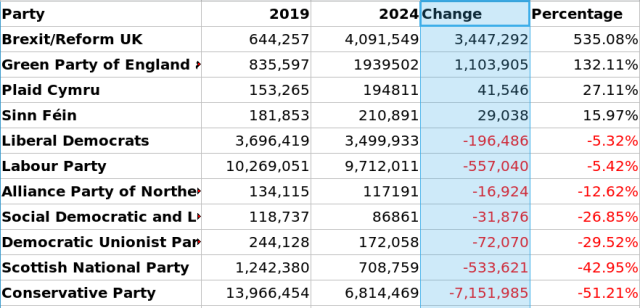OK, the first thing to say about #GeneralElectionUK 2024 is this: #Labour lost, and lost badly. They lost, in fact, HALF A MILLION VOTES compared to their 2019 result.
All the major parties, including the #LibDems, lost. Labour just lost less badly than either the #Conservatives or the #SNP.
https://www.journeyman.cc/blog/posts-output/2024-07-06-the-election-and-after/
The election, and after
In any election in a reasonably democratic voting system — such as that used for the Scottish Parliament and the Welsh Senedd, for example, the number of seats in the resulting parliament assigned to a party is proportional to the number seats they w…Simon Brooke (The Fool on the Hill)
This entry was edited (2 weeks ago)
reshared this


GeofCox
in reply to Simon Brooke • • •Interesting table. There are obviously some special factors in play - eg. for the SNP and DUP - but it does tend to confirm the big changes in voter behaviour that were already pretty clear in many 'western democracies':
1. Declining turnout; and
2. Movement to political extremes.
I would argue these are both in fact symptoms of disillusion with the 'moderate' political centre and its rotating duopoly that never seems to really affect people's lives.
But I have to say, even though I'm familiar with this trend, I was surprised that given just how appalling the Tory government has been - and not just its policies, but divided and incompetent and corrupt too - less than 60% of the electorate were motivated enough to try to vote them out.
Pete Alex Harris🦡🕸️🌲/∞🪐∫
in reply to GeofCox • • •Seb
in reply to Pete Alex Harris🦡🕸️🌲/∞🪐∫ • • •Simon Brooke
in reply to Seb • • •@seb321 @GeofCox @petealexharris Indeed. And given the number of separate envelopes we have to return anyway, one more would not be a great deal of extra hassle.
https://www.electoralcommission.org.uk/sites/default/files/pdf_file/Polling-station-handbook-UKPE.pdf#page=21
GeofCox
in reply to Simon Brooke • • •@seb321 @petealexharris
It's true of course that voter suppression and other factors are in play in the UK, and some other countries - but declining turnout is an almost universal, long-term trend across 'western democracies', so I think you also have to look for factors common to all these countries that are increasingly driving people to give up on voting.
Simon Brooke
in reply to GeofCox • • •@GeofCox @seb321 @petealexharris we have developed a professional political class, all of whom have far more in common with one another than they have with ordinary people. Consequently, ordinary people feel alienated.
Because we are.
The parties have a consensus around the things the big donors want, because the same big donors fund all the parties. So they all support private ownership of the means of production, of services we all need, of housing, of fossil fuel extraction, for example.
GeofCox
in reply to Simon Brooke • • •I agree - and i would add 2 points:
1. Journalists and broadcasters on politics and current affairs are part of that professional political class - for them, it's interesting who's in and who's out, politics as a competitive game - but they therefore detach it from our everyday lives - they MAKE politics boring and irrelevant; and
2. 40 years of neoliberalism, plus globalisation and the internet, have resulted in such a massive transfer of wealth and power from the public (both people and governments) to super-wealthy multinational corporations and individuals that parliamentary politics really is more constrained, really does matter less and less.
@seb321 @petealexharris